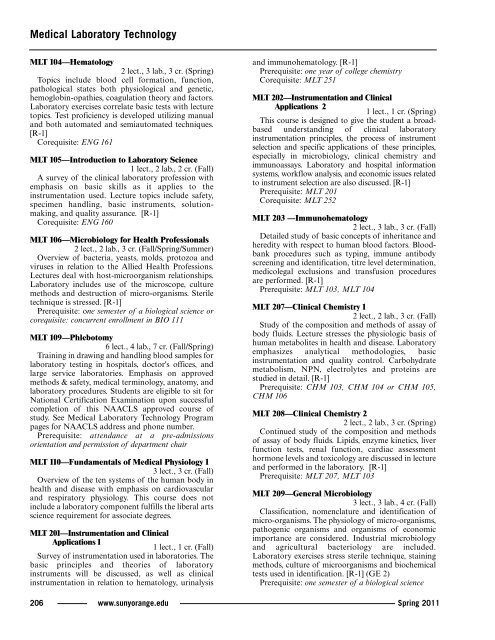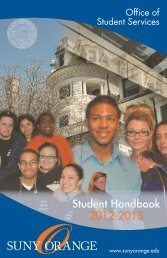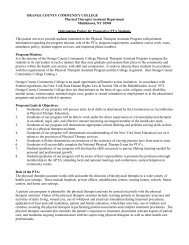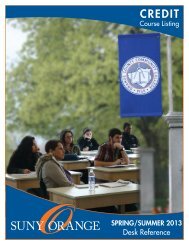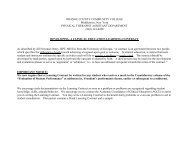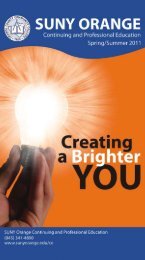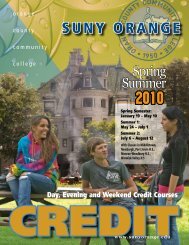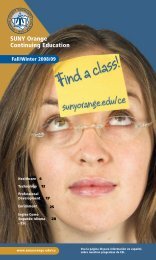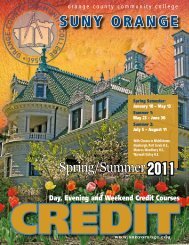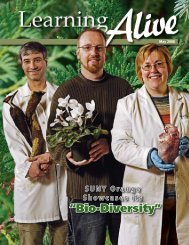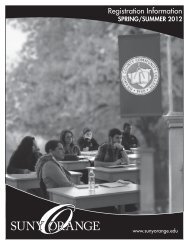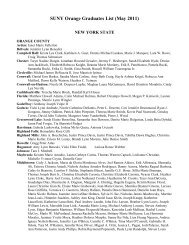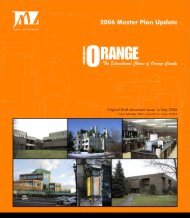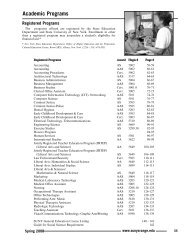Medical Laboratory TechnologyMLT 104—Hematology2 lect., 3 lab., 3 cr. (<strong>Spring</strong>)Topics include blood cell formation, function,pathological states both physiological and genetic,hemoglobin-opathies, coagulation theory and factors.Laboratory exercises correlate basic tests with lecturetopics. Test proficiency is developed utilizing manualand both automated and semiautomated techniques.[R-1]Corequisite: ENG 161MLT 105—Introduction to Laboratory Science1 lect., 2 lab., 2 cr. (Fall)A survey of the clinical laboratory profession withemphasis on basic skills as it applies to theinstrumentation used. Lecture topics include safety,specimen handling, basic instruments, solutionmaking,and quality assurance. [R-1]Corequisite: ENG 160MLT 106—Microbiology for Health Professionals2 lect., 2 lab., 3 cr. (Fall/<strong>Spring</strong>/Summer)Overview of bacteria, yeasts, molds, protozoa andviruses in relation to the Allied Health Professions.Lectures deal with host-microorganism relationships.Laboratory includes use of the microscope, culturemethods and destruction of micro-organisms. Steriletechnique is stressed. [R-1]Prerequisite: one semester of a biological science orcorequisite: concurrent enrollment in BIO 111MLT 109—Phlebotomy6 lect., 4 lab., 7 cr. (Fall/<strong>Spring</strong>)Training in drawing and handling blood samples forlaboratory testing in hospitals, doctor's offices, andlarge service laboratories. Emphasis on approvedmethods & safety, medical terminology, anatomy, andlaboratory procedures. Students are eligible to sit forNational Certification Examination upon successfulcompletion of this NAACLS approved course ofstudy. See Medical Laboratory Technology Programpages for NAACLS address and phone number.Prerequisite: attendance at a pre-admissionsorientation and permission of department chairMLT 110—Fundamentals of Medical Physiology 13 lect., 3 cr. (Fall)Overview of the ten systems of the human body inhealth and disease with emphasis on cardiovascularand respiratory physiology. This course does notinclude a laboratory component fulfills the liberal artsscience requirement for associate degrees.MLT 201—Instrumentation and ClinicalApplications 11 lect., 1 cr. (Fall)Survey of instrumentation used in laboratories. Thebasic principles and theories of laboratoryinstruments will be discussed, as well as clinicalinstrumentation in relation to hematology, urinalysisand immunohematology. [R-1]Prerequisite: one year of college chemistryCorequisite: MLT 251MLT 202—Instrumentation and ClinicalApplications 21 lect., 1 cr. (<strong>Spring</strong>)This course is designed to give the student a broadbasedunderstanding of clinical laboratoryinstrumentation principles, the process of instrumentselection and specific applications of these principles,especially in microbiology, clinical chemistry andimmunoassays. Laboratory and hospital informationsystems, workflow analysis, and economic issues relatedto instrument selection are also discussed. [R-1]Prerequisite: MLT 201Corequisite: MLT 252MLT 203 —Immunohematology2 lect., 3 lab., 3 cr. (Fall)Detailed study of basic concepts of inheritance andheredity with respect to human blood factors. Bloodbankprocedures such as typing, immune antibodyscreening and identification, titre level determination,medicolegal exclusions and transfusion proceduresare performed. [R-1]Prerequisite: MLT 103, MLT 104MLT 207—Clinical Chemistry 12 lect., 2 lab., 3 cr. (Fall)Study of the composition and methods of assay ofbody fluids. Lecture stresses the physiologic basis ofhuman metabolites in health and disease. Laboratoryemphasizes analytical methodologies, basicinstrumentation and quality control. Carbohydratemetabolism, NPN, electrolytes and proteins arestudied in detail. [R-1]Prerequisite: CHM 103, CHM 104 or CHM 105,CHM 106MLT 208—Clinical Chemistry 22 lect., 2 lab., 3 cr. (<strong>Spring</strong>)Continued study of the composition and methodsof assay of body fluids. Lipids, enzyme kinetics, liverfunction tests, renal function, cardiac assessmenthormone levels and toxicology are discussed in lectureand performed in the laboratory. [R-1]Prerequisite: MLT 207, MLT 103MLT 209—General Microbiology3 lect., 3 lab., 4 cr. (Fall)Classification, nomenclature and identification ofmicro-organisms. The physiology of micro-organisms,pathogenic organisms and organisms of economicimportance are considered. Industrial microbiologyand agricultural bacteriology are included.Laboratory exercises stress sterile technique, stainingmethods, culture of microorganisms and biochemicaltests used in identification. [R-1] (GE 2)Prerequisite: one semester of a biological science206 www.sunyorange.edu <strong>Spring</strong> <strong>2011</strong>
Medical Laboratory Technology - MusicMLT 212—Clinical Microbiology2 lect., 3 lab., 3 cr. (<strong>Spring</strong>)The identification and quantification of pathologicand non-pathologic organisms encountered in humanspecimens. Treatment and handling of specimens arediscussed. Methods in mycology, parasitology andserology as applicable to the clinical laboratory aretaught. [R-1]Prerequisite: MLT 209MLT 216—Histology2 lect., 3 lab., 3 cr. (<strong>Spring</strong>)The microscopic study of vertebrate cells, tissuesand organs, stressing the relationship of structure tofunction. Laboratory work includes the preparationof stained slides for light microscopic study and studyof prepared slides of cells, tissues and organs toenable the student to identify basic tissues. [R-1]Prerequisite: one semester of a biological scienceMLT 251—Clinical Training 16 lab., 2 cr.Under the supervision of clinical proctors, studentspractice medical laboratory techniques. [R-1]Prerequisite: MLT 101, MLT 102, MLT 104, MLT103Corequisite: MLT 201, MLT 207MLT 252—Clinical Training 26 lab., 2 cr.Continuation of clinical experience. Under thesupervision of clinical proctors, students gainadditional experience in developing technical skills.[R-1]Prerequisite: MLT 203, MLT 209Corequisite: MLT 202, MLT 208 and MLT 212, orcompletion of all professional coursesMusic(Arts & Communication Department)MUS 101—Introduction to Music3 cr. (Fall/<strong>Spring</strong>/Summer)Enjoyment of music through the study of basicmusical concepts and acquisition of listening skills.Examines a wide variety of musical styles within theircultural contexts. (GE 8)MUS 103—History of Western Music to 17503 cr. (Fall)A survey of the music of ancient cultures includingGreece and Rome and the Early Christian, Medieval,Renaissance, and Baroque periods. Social, political,historical, and cultural influences are considered. Thiscourse includes extensive classroom listening to themusic of the great composers culminating in theworks of Bach and Handel. (GE 7)MUS 104—History of Western Music from 17503 cr. (<strong>Spring</strong>)A survey of the music of the Classical, Romantic,and Twentieth century periods. Social, political,historical and cultural influences are considered. Thiscourse includes extensive classroom listening to themusic of the great composers from Mozart andBeethoven to contemporary artists. (GE 7)MUS 105—History of Jazz3 cr. (Fall/<strong>Spring</strong>)A study of jazz from its origin to the present. Anexamination of the important musicians, styles, andinfluences through recorded examples of ragtime,blues, Dixieland, swing, bop, progressive jazz, thirdstream, and contemporary trends. (GE 7)MUS 107—History of Rock Music3 cr. (Fall/<strong>Spring</strong>/Summer)A survey of rock music from its origins in African-American and Anglo-American folk styles throughthe present. Examines the entire phenomenon of rockmusic, its relationship to other musical styles, theinfluence of social factors on the music, and theinfluence of the music, in turn, on society. (GE 7)MUS 109—Music Business3 cr. (Fall/<strong>Spring</strong>)An introductory course exploring practical, legal,and procedural problems encountered in the musicindustry. A variety of career areas are surveyed toprovide an orientation for students preparing for acareer in music as well as those planning to transfer tofour-year programs in the music business and otherfields.<strong>Spring</strong> <strong>2011</strong>www.sunyorange.edu207
- Page 1 and 2:
Orange CountyCommunity CollegeSprin
- Page 3 and 4:
Message from the PresidentDear Stud
- Page 5 and 6:
About SUNY OrangeThe Middletown Cam
- Page 7:
About SUNY OrangeHudson Valley Educ
- Page 10 and 11:
Admissions Procedures and Requireme
- Page 12 and 13:
Admissions Procedures and Requireme
- Page 14 and 15:
Admissions Procedures and Requireme
- Page 16 and 17:
Educational Partnershipsdevelopment
- Page 18 and 19:
Community PartnershipsThe Departmen
- Page 20 and 21:
Refund PoliciesRefund PoliciesStude
- Page 22 and 23:
Financial AidA variety of financial
- Page 24 and 25:
Financial Aiddependents, or C) a de
- Page 26 and 27:
Financial AidThe student must be en
- Page 28 and 29:
Financial Aidfor 10 to 15 hours wor
- Page 30 and 31:
Financial AidCHOOSING A REPAYMENT P
- Page 32 and 33:
Financial AidWe encourage students
- Page 34 and 35:
Scholarship Opportunities 2010 - 20
- Page 37 and 38:
Academic Policies and ProceduresThe
- Page 39 and 40:
Course Policies and Proceduressched
- Page 41 and 42:
Grades and Grading / Academic Stand
- Page 43 and 44:
• Have a CumGPA lower than 2.0 at
- Page 45 and 46:
class absences and may withdraw stu
- Page 47 and 48:
student is encouraged to contact th
- Page 49 and 50:
Student ServicesStudent Services is
- Page 51 and 52:
Student Servicesexperiences. We wor
- Page 53 and 54:
Student ActivitiesParking TagsParki
- Page 55 and 56:
Learning Assistance ServicesSUNY Or
- Page 57 and 58:
Permitted Credit Courses for Studen
- Page 59 and 60:
Permitted Credit Courses for Studen
- Page 61:
Learning ResourcesThe Writing Consu
- Page 65 and 66:
Degrees / General Degree Requiremen
- Page 67 and 68:
AccountingDegree Awarded: Associate
- Page 69 and 70:
AccountingDegree Awarded: Associate
- Page 71 and 72:
Accounting ProceduresDegree Awarded
- Page 73 and 74:
Architectural TechnologyDegree Awar
- Page 75 and 76:
Business AdministrationDegree Award
- Page 77 and 78:
Business ManagementDegree Awarded:
- Page 79 and 80:
Business StudiesDegree Awarded: Cer
- Page 81 and 82:
Clerical Office AssistantDegree Awa
- Page 83 and 84:
Computer Information Technology-Net
- Page 85 and 86:
Computer Information Technology-Web
- Page 87 and 88:
Computer ScienceDegree Awarded: Ass
- Page 89 and 90:
Criminal JusticeDegree Awarded: Ass
- Page 91 and 92:
Criminal Justice-PoliceDegree Award
- Page 93 and 94:
Cyber SecurityDegree Awarded: Assoc
- Page 95 and 96:
Dental HygieneDegree Awarded: Assoc
- Page 97 and 98:
Early Childhood Development and Car
- Page 99 and 100:
Early Childhood Development and Car
- Page 101 and 102:
Electrical Technology-Telecommunica
- Page 103 and 104:
Emergency ManagementDegree Awarded:
- Page 105 and 106:
Engineering ScienceDegree Awarded:
- Page 107 and 108:
Exercise StudiesDegree Awarded: Ass
- Page 109 and 110:
Honors ProgramDegree Awarded: Assoc
- Page 111 and 112:
Human ServicesDegree Awarded: Assoc
- Page 113 and 114:
International StudiesDegree Awarded
- Page 115 and 116:
Jointly Registered Teacher Educatio
- Page 117 and 118:
Jointly Registered Teacher Educatio
- Page 119 and 120:
Jointly Registered Teacher Educatio
- Page 121 and 122:
Jointly Registered Teacher Educatio
- Page 123 and 124:
Jointly Registered Teacher Educatio
- Page 125 and 126:
Law Enforcement/SecurityDegree Awar
- Page 127 and 128:
Liberal Arts: Humanities and Social
- Page 129 and 130:
Liberal Arts: Individual StudiesDeg
- Page 131 and 132:
Liberal Arts and Sciences: Mathemat
- Page 133 and 134:
MarketingDegree Awarded: Associate
- Page 135 and 136:
Medical Laboratory TechnologyDegree
- Page 137 and 138:
Medical Office AssistantDegree Awar
- Page 139 and 140:
NursingDegree Awarded: Associate in
- Page 141 and 142:
NursingDegree Awarded: Associate in
- Page 143 and 144:
Occupational Therapy AssistantDegre
- Page 145 and 146:
Office TechnologiesDegree Awarded:
- Page 147 and 148:
Performing Arts: MusicDegree Awarde
- Page 149 and 150:
Physical Therapist AssistantDegree
- Page 151 and 152:
Radiologic TechnologyDegree Awarded
- Page 153 and 154:
Teaching AssistantDegree Awarded: C
- Page 155 and 156:
TelecommunicationsDegree Awarded: C
- Page 157 and 158: Visual Communications Technology: G
- Page 159 and 160: SUNY General Education Course Listi
- Page 161: Non-SUNY Elective CategoriesThe fol
- Page 164 and 165: Online LearningSUNY Orange currentl
- Page 166 and 167: Accounting - AnthropologyACC 211—
- Page 168 and 169: Architectural Technology - ArtARC 2
- Page 170 and 171: Artand medium. A museum trip may be
- Page 172 and 173: BiologyBiology(Biology Department)B
- Page 174 and 175: Biology - BusinessBIO 202—Compara
- Page 176 and 177: ChemistryChemistry(Science, Enginee
- Page 178 and 179: CommunicationOrange college radio w
- Page 180 and 181: Computer Information Technology (CI
- Page 182 and 183: Computer ScienceComputer Science(Ap
- Page 184 and 185: Criminal Justiceadministration as t
- Page 186 and 187: Dental HygieneDental Hygiene(Dental
- Page 188 and 189: Economics - EducationEconomics(Psyc
- Page 190 and 191: EducationPrerequisite: EDU 101, EDU
- Page 192 and 193: EngineeringEngineering(Science, Eng
- Page 194 and 195: Englishconstruction of expository e
- Page 196 and 197: English - Field Studies: Travelrela
- Page 198 and 199: Geology - HealthGeology(Science, En
- Page 200 and 201: History - Honorsand ends with the P
- Page 202 and 203: Honors - Human Servicestrends of cu
- Page 204 and 205: Management - MarketingManagement(Bu
- Page 206 and 207: Mathematicsmathematics, and growth
- Page 210 and 211: MusicMUS 111—Audio Engineering an
- Page 212 and 213: Music - NursingMUS 226—Elements o
- Page 214 and 215: NursingPrerequisites: ENG 101-2, BI
- Page 216 and 217: Occupational Therapy Assistant - Of
- Page 218 and 219: Philosophy & Religion - Physical Ed
- Page 220 and 221: Physical Education/Exercise Studies
- Page 222 and 223: Physical Therapist AssistantPhysica
- Page 224 and 225: PhysicsPhysics(Science, Engineering
- Page 226 and 227: Psychology - Radiologic TechnologyP
- Page 228 and 229: Radiologic Technology - SociologyRA
- Page 231 and 232: State University of New YorkBoard o
- Page 233 and 234: Administrative StaffCareer and Inte
- Page 235 and 236: Faculty and Professional StaffEilee
- Page 237 and 238: Faculty and Professional StaffJames
- Page 239 and 240: Faculty and Professional StaffKathl
- Page 241 and 242: Faculty and Professional StaffEric
- Page 243 and 244: Faculty and Professional StaffLione
- Page 245 and 246: Adjunct FacultySandra Aber (2008)In
- Page 247 and 248: Adjunct FacultyJohn Cosco (2005)Ass
- Page 249 and 250: Adjunct FacultyLinda Gendelman (200
- Page 251 and 252: Adjunct FacultyEvelyn Kinbar (1997)
- Page 253 and 254: Adjunct FacultySue Misiak (2002)Ins
- Page 255 and 256: Adjunct FacultyPeggy Roda (2003)Ins
- Page 257 and 258: Adjunct FacultyKaren Vespo (2008)In
- Page 259 and 260:
Advisory BoardsAccountingGary Cassi
- Page 261 and 262:
Advisory BoardsBarbara Hansen, RNSt
- Page 263 and 264:
Advisory BoardsBon Secours Communit
- Page 265 and 266:
Academic CalendarSPRNG 2011January
- Page 267 and 268:
Index24 Credit Hour Program .......
- Page 269 and 270:
DirectionsMiddletown, NY CampusNewb


